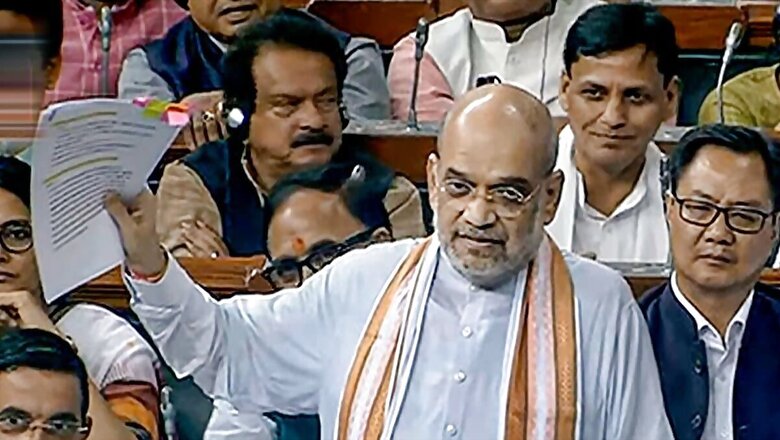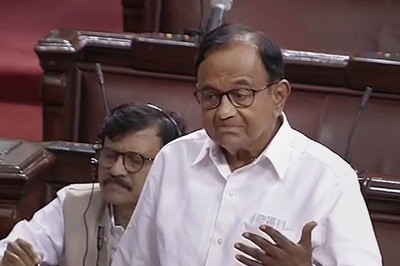
views
Heinous crimes, terrorism and organised syndicates, social realities and challenges, colonial baggage – the new Bharatiya Nyaya Sanhita 2023, which is expected to replace the Indian Penal Code 1860, addresses all such issues and introduces special provisions in view of the constantly changing nature of crime.
Union home minister Amit Shah introduced the Bharatiya Nyaya Sanhita (BNS), Bharatiya Nagarik Suraksha Sanhita (BNSS) and Bharatiya Sakshya (BS) bills in Lok Sabha on Friday (August 12) and these will replace the IPC, Criminal Procedure Code, and the Indian Evidence Act, respectively.
According to government officials, the new legislation will provide a mechanism for effectively dealing with such crimes and criminals along with having a deterrent effect. In fact, it has a victim-centric approach that may have been missing in the 160-year-old IPC, which was created to make British rule paramount rather than safeguard human rights, officials said.
This intrinsically turned it into a carrier of a colonial hangover even after independence, with laws related to sedition and protection of treasury. Hence, officials said, one of its most far-reaching contribution would be erasing the sections on sedition. They added that the use and misuse of sedition, since the time it was introduced by the British, has always been a potent instrument in the hands of the government of the day. In independent India, too, the judiciary has time and again made observations about this law even to the extent of ordering a review.
Here is how the new Bharatiya Nyaya Sanhita 2023 addresses a myriad issues at once:
- Serious crimes given precedence, sections simplified: The new law has tried to define these incidents and provide mechanisms to effectively deal with such criminals. Murder, offences against women and children as well as the State have been given precedence. For example, Section 375 (rape) has been renumbered to Section 63. Similarly, the existing Section 300, which defines murder, will now be Section 99. Definitions scattered from sections 6 to 52 have been brought under one section now. Overlapping sections have been merged and simplified, and will have only 356 sections as against 511 sections in the existing IPC.
- Prevention of crime against women: Officials said proper investigation is the priority of any government. Instances of false promise of marriage, gangrape of minors, mob lynching, chain snatching among others are reported but the IPC did not have specific provisions to deal with these crimes. In cases of false promise of marriage, where women are abandoned after establishing sexual relations, a provision (Section 69) has been made in the new law. It has also been proposed that punishment for the two categories of gangrape may be combined and punishment for gangrape on a woman under the age of 18 shall be life imprisonment or death.
- Mob lynching, Section 101(2): On widespread media coverage of mob lynching cases, the Centre had assured parliament that the issue will be suitably addressed. The new provision has defined punishment from seven years’ imprisonment to death or life imprisonment.
- Provisions related to snatching, idol theft: There was no provision presently to deal with the offence of snatching, a rampant crime. A new section, Section 302, has been inserted with imprisonment extendable to three years and liable to fine. A provision, Section 303(d), to cover theft of an idol has also been made.
- Child trafficking: It is proposed that trafficking into India from any country outside India any girl under the age of 21 or any boy under the age of 18 with the intent that such person will be forced or seduced to illicit sexual acts with another person has been made punishable with imprisonment which may extend to 10 years. At present, there is no provision to prosecute a person who employs or engages a child for the purpose of committing offences. A new section has been added in the bill to make hiring, employing or engaging a child to commit an offence as a punishable crime, and the punishment will be imprisonment of a minimum of seven years extendable to 10 years. Both boys and girls are trafficked for sexual exploitation. The word “minor girl” has been replaced with the word “child” to cover both male and female children below the age of 18 and the offence of procurement has been made punishable.
- Dealing with organised crime: A new penal section has been added related to organised crime. This section penalises any unlawful activity either by a member of a crime syndicate or on behalf of such syndicate by use of violence, coercion or other lawful means to accrue direct or indirect material and financial gains. The gains will include tangible and intangible both. The section provides for death sentence or imprisonment for life as punishment in case the unlawful act results in the death of any person. In other cases, minimum punishment of five years (extendable to life imprisonment) has been provided for members of crime syndicates. Barring spouse, anyone who intentionally conceals or harbours any accused under this section, shall be punished with a minimum imprisonment of three years. The section has provision for minimum three-year imprisonment of a person, who holds any property gained through organized crime.
- Acts of terrorism: This section includes any act carried out to threaten unity, integrity and security of India; to intimidate general public or to disturb public order by using a range of lethal weapons and any other life endangering substance. It also covers acts of hijacking and abduction of any person to compel the government. Besides, it considers any act as a terrorist act, which is covered under the second schedule of the Unlawful Activities (Prevention) Act. Anyone who is involved, directly or indirectly, in terrorist act will be treated as terrorist under this section. Similarly, any entity, owned or managed by terrorists or group of terrorists, which is involved in terrorist acts will be considered as terrorist organization. Besides, any death due to terrorist act will draw the punishment of death or life imprisonment with minimum fine of rupees ten lakh. In any other case, minimum punishment will be five years (extendable to life imprisonment). This section also provides for minimum punishment of five years (extendable to life imprisonment) for those who engage in any act in a preparation of any terrorist act.
- Ex-parte trial and conviction of fugitives: To deal with permanent fugitives/absconders during an ongoing trial, a special provision has been inserted in court. In case a person is a declared proclaimed offender and is evading trial with no possibility of arrest in near future, the court will not stop the trial in any manner. It will proceed in a way as if the absconder was present and pronounce the judgement.
- Trial in absentia: A new section on trial in absentia has been inserted for the persons declared proclaimed offenders. It is provided that the trial in the absence of the accused will start after three months from the date of framing charges. The accused who is tried in absentia, will be provided an advocate by the State for his defence. Trial in absentia will not be limited to recording of evidence of witnesses, which is the current provision, but it will be up to judgement and punishment.
- Removing sedition from criminal law: The existing offence of sedition that criminalises acts of hatred or contempt towards the government has been repealed. Officials, however, said an act of secession, armed rebellion, subversive activities, separatist activities or endangering sovereignty or unity and integrity of India has been added in the law. The new provision, Section 150, states: “Whoever, purposely or knowingly, by words, either spoken or written, or by signs, or by visible representation, or by electronic communication or by use of financial mean, or otherwise, excites or attempts to excite, secession or armed rebellion or subversive activities, or encourages feelings of separatist activities or endangers sovereignty or unity and integrity of India; or indulges in or commits any such act shall be punished with imprisonment for life or with imprisonment which may extend to seven years and shall also be liable to fine”.




















Comments
0 comment